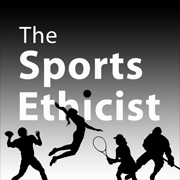Two story lines getting attention in the sporting world are Novak Djokovic’s deportation from Australia prior to the Australian Open and the recent legal changes to COVID vaccine requirements in France that seem likely to impact the Champions League.
I’ve resisted writing about sport and vaccine mandates or related topics. Partly this is because I am always reticent to step into (overly) politicized topics (see my An Argument against Athletes as Political Role Models for more on why). But mainly it’s because it is not really about sport. It’s about health, it’s about policy, it’s about the limit and role of government. It is not about sport as such.
But there is an angle I think worth looking at. COVID-19 has affected all of us, throughout the globe. Certainly, some much more significantly than others, but everyone has been touched by it. And from very early on in the pandemic, sport has been a focal point (and a flashpoint).
It was the cancellation of sporting events in March 2020 that signaled to the wider public the seriousness of this new illness. It was the return to play that offered a mix of hope and trepidation. As sports came back, there were questions about testing: who should be tested? How often? What do the test means? Then as the vaccines become available: who should get vaccinated? When? And how should an athlete’s vaccination status affect testing, playing, quarantining, etc. And now we see many sport leagues revising their COVID related polices to reflect the shift to the impending endemic nature of the virus. Some view this as some kind of surrender and a path towards greater illness, while many others see the need to adapt the norms and rules that we live by to reflect the reality that the virus is here to stay.
Each of these questions raised in regard to sport are the very same questions and concerns throughout society. Should we cancel schools? How should we deal with testing in schools? Should vaccines be mandated in school children, college students? And how do schools adapt (should schools adapt) to a future with endemic COVID? Or switch to any industry. Or to religious institutions. To restaurants and movie theaters. And so on throughout society. These same questions and concerns are raised in each and ever one of these domains.
But sport is not just another domain, one among thousands, that is dealing with all these issues. Sport is the closest thing we have to something universal. Not everyone has a kid in school or attends religious services. Almost no one pays attention to what is going in industries beyond their own. Few people pay attention to policy fights on the municipal level. But almost everyone, everywhere in the world, cares about sport in some fashion. It could be as fans. It could be as parents with children in youth sports. It could be as a player at any level, from pick-up games to the pros. Our (near) universal interest in sport makes it impossible to ignore these questions.
To be clear: I’m not at all suggesting that sport is leading the way or that we should take the policies of sport and apply them writ large or use them as guidance in our lives. My point is that sport carries with it, exposes and reflects all the major trends, issues, topics, concerns, etc. of society. The pandemic has highlighted that to a degree I am not sure we have seen before. However, we can see the same thing in race relations, in gender issues, in drug policies, in parenting, in governance, in questions of access and opportunity, and so many other areas. It is hard to come up with some societal issue that doesn’t find its way into a sporting context.
Why and how is sport so interwoven with our lives? There are many philosophical, psychological, and sociological reasons why this might be.
Let me just suggest one path. Sport is fundamentally about the pursuit of goals and the development of personal and social excellences to strive for and achieve those goals. And since sport is embodied, it requires, more or less, our whole being: our mental, physical, emotional processes and skills are united in sport. Sport does this in a repeatable, yet limited, context such that we can focus in on, analyze, and thoroughly examine each aspect of these skills and means towards the goals. In this way, it essentializes and concretizes what is so central to being human: we are goal-directed beings who have to develop habits, characters, relationships, and norms of conduct to achieve our goals and flourish. We only have one life to do this in: and hopefully it takes many, many decades to pan out. Sport, though, allows us to experience, in a stylized way, the whole of life in 90 minutes; and to then do it again the next day.
This is in part what makes philosophy of sport (and the study of sport more generally) so important. Sport shows us humanity. To study sport is to study human beings; how we live and interact with each other: what we strive for, what we love, what we hate, and what we are.





